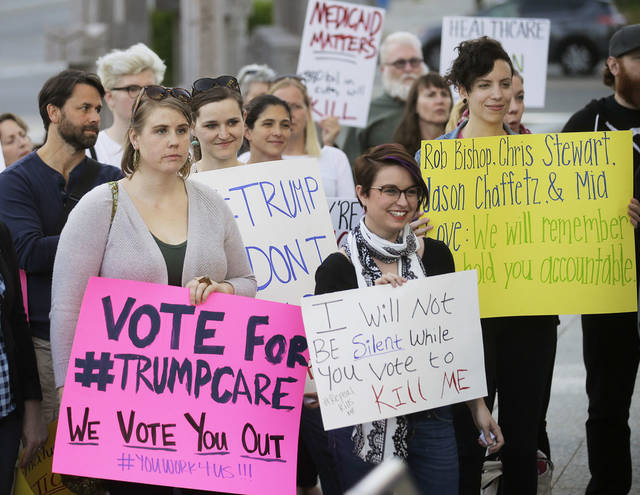CHERRY HILL, N.J. — Even as the Republican health care overhaul remains a work in progress, states are planning for big changes that could swell the ranks of the uninsured and hit them with higher costs.
A key tenet underlying the GOP plan is to give states more authority over how to structure their health care markets. That approach is welcome in states that want fewer mandates from the federal government but is causing alarm in states that embraced former President Barack Obama’s Affordable Care Act.
This is especially true for states that expanded their Medicaid programs and could now see a huge pool of federal health care money evaporate. They will face tough decisions about balancing costs and care.
States’ preparations come even as Republican members of the U.S. Senate promise significant revisions to the health care bill that narrowly passed last week in the House. Some governors already have begun pressing their senators to soften the bill in ways that would lessen the financial blow to the states.
The current GOP plan would undo a mostly federally funded expansion of Medicaid coverage for low-income adults and allow insurance companies to charge far higher premiums on older Americans and some people with pre-existing conditions.
Republican Gov. Bruce Rauner of Illinois, a state that expanded coverage under Obama’s law, said he will push senators to change the legislation so the impacts are not as dire for the state.
“Recent changes did not address fundamental concerns about the bill’s impact on the 650,000 individuals that are part of our Medicaid expansion population,” he said, “nor have those changes eased the concerns of the 350,000 people in the individual market who are dealing with skyrocketing premiums and fewer choices.”
Undoing Obama’s law has been a goal for Republican lawmakers since it was adopted in 2011 and was a top campaign promise of President Donald Trump.
As soon as Trump was elected, state officials were on notice that changes were likely.
Even if it gets major revisions in the Senate, the House bill is serving as a baseline for a task force in New Jersey organized by Joseph Vitale, chairman of the state Senate’s health committee. It starts meeting this month to consider how the state might respond.
“It’s unlikely to get worse from here from where they landed yesterday,” Vitale said Friday, a day after the House vote.
Officials in Connecticut have set up a similar task force, and New York lawmakers say they are prepared to hold a special session later this year to deal with any fallout from the health care changes.
New Jersey, along with 30 other states and the District of Columbia, accepted a core deal from Obama’s health overhaul to expand Medicaid; 550,000 people have gained coverage through it in New Jersey alone. Nationwide, the Medicaid expansion provided coverage to about 11 million people who were newly eligible.
No government estimates have been released showing how much it would cost the states to keep the expansion and pay for it on their own.
In March, a Congressional Budget Office estimate for an earlier version of the bill said it eventually would lead to 24 million Americans losing their health coverage. The same report found that federal Medicaid subsidies to states, which run the programs, would be $880 billion less over 10 years because of the end of the expansion and other changes that would affect allocations even to states that chose not to expand.
In a report this week, Fitch Ratings said states would have to make “material, but not impossible” budget changes to absorb the blow. But it also said implementing those changes by 2020 gives states little time to figure out what to do.
New York officials estimate the GOP bill would lead to 2.7 million residents losing coverage and the state losing up to $6.9 billion in federal Medicaid money. Gov. Andrew Cuomo said such cuts would reduce support for hospitals, nursing homes and 7 million New Yorkers who rely on the program.
“They’re trying to gut Medicaid,” he said Friday. “They’re trying to put our hospitals out of business.”
It’s not just Democratic governors sounding the alarm.
Ohio Gov. John Kasich, a former Republican candidate for president, has been consistently critical of his own party’s attempts to make deep cuts in the Medicaid program. He supported Medicaid expansion in his state and called the House bill “woefully short on the necessary resources to maintain health care for our nation’s most vulnerable citizens.”
Underscoring those concerns, Ohio Sen. Rob Portman, a Republican, said he does not support the House bill in its current form, in part because it does not protect Ohioans who benefited from the Medicaid expansion.
Katherine Hempstead, who analyzes health policy at the Robert Wood Johnson Foundation, said she does not expect any states to be able to afford keeping the Medicaid expansion in place.
But she said some could choose to use federal money for subsidies, in addition to what would be offered anyway, for people who buy insurance on the individual market. In many states, premiums have been rising and insurance choices dwindling.
“States might face a choice of what population they want to reinforce,” she said.





